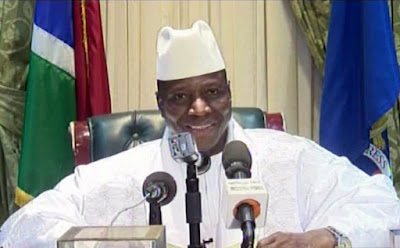Gambian ruler Yahya Jammeh step down from power after regional leaders flew in for last-ditch negotiations
Jammeh only agreed to step down from power after regional leaders flew in for last-ditch negotiations and a regional military force was poised to swoop in and force him out. Often startlingly outspoken, Jammeh was more diplomatic when he said he would leave power, and Gambia, in a statement early Saturday.
Jammeh ruled the tiny West African country for more than two decades and once vowed to rule for a billion years. He represented one of a dwindling number of West African leaders staying in office without apparent limit. Getting him to leave peacefully may help the vast region move toward more stable transfers of power.

Jammeh ruled the tiny West African country for more than two decades and once vowed to rule for a billion years. He represented one of a dwindling number of West African leaders staying in office without apparent limit. Getting him to leave peacefully may help the vast region move toward more stable transfers of power.

Jammeh has been described as mercurial, unpredictable. And he is prone to the dramatic: He shocked Gambians by conceding his December election loss in a jovial telephone call on live television to victor Adama Barrow. But a week later he announced he had changed his mind. With the possibility of prosecution hanging over him for human rights abuses alleged during his time in power, he decided to challenge the election results in court.
The international community was not amused, and the U.N. secretary-general, the head of the African Union continental body and others announced their support for Gambia's new leader, Barrow, who was in neighboring Senegal for his safety and who was inaugurated there on Thursday.
Jammeh became increasingly isolated: Several cabinet ministers resigned and his security forces abandoned him. A West African regional military force with tanks rolled into Gambia and threatened to remove Jammeh by force.
Jammeh, who first seized power in a 1994 coup, insisted that his rule was ordained by Allah. After his election loss, he declared that "only Allah" could make him leave.
Human rights groups have long accused Jammeh of arresting, jailing and killing political opponents, and fears for Barrow's safety have kept the newly inaugurated president in neighboring Senegal for now. Jammeh also issued increasingly virulent statements against sexual minorities, vowing to slit the throats of gay men and saying the LGBT acronym should stand for "leprosy, gonorrhea, bacteria and tuberculosis."
As other longtime West African strongmen have died or been forced to step down in recent years, Jammeh has remained a rare exception — even launching a campaign to anoint himself "King of Gambia."
Jammeh has a history of making startling declarations. In 2007, he claimed to have developed a cure for AIDS that involved an herbal body rub and bananas. Alarming public health experts, he insisted AIDS sufferers stop taking antiretroviral medications and try his cure instead.
Two years later, his government rounded up nearly 1,000 people it accused of being witches, forcing them to drink a hallucinogen that caused diarrhea and vomiting. Two people died, according to Amnesty International.
More recently, Jammeh seemed bent on increasing Gambia's isolation. In 2013 he exited the Commonwealth, a group made up mostly of former British colonies, dismissing it as a "neo-colonial institution." And last year, he announced that the country would leave the International Criminal Court, calling it the "International Caucasian Court."
YahooNews



Comments
Post a Comment